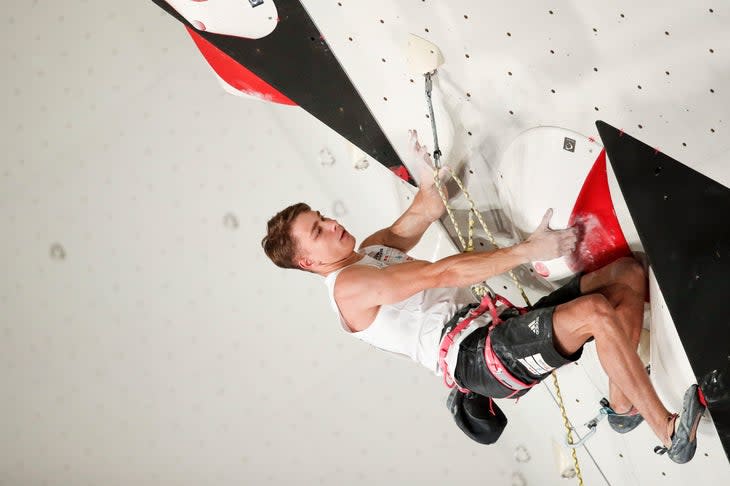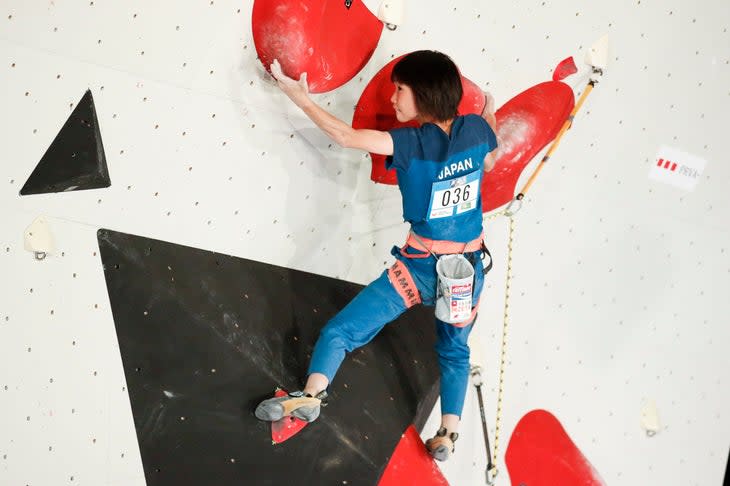World Cup Upset; Garnbret Gracious in Defeat; Raboutou Makes Podium. Results.
- Oops!Something went wrong.Please try again later.
- Oops!Something went wrong.Please try again later.
This article originally appeared on Climbing
Leading into this weekend's Lead World Cup in Koper, Slovenia, it felt like fans had gone a long time without any World Cup action. In fact, it had been a month and a half since the previous event, which was a long time considering how jam-packed May, June, and July were with events in various disciplines across multiple continents.
That's not to say this cooler, golden period between late summer and early fall was totally without competition excitement. For instance, the IFSC held both its European Championships and Youth World Championships in late August to plenty of fanfare. But the lack of World Cups amplified the anticipation for this weekend's event. Also, the fact that this weekend's World Cup was set to take place at a new venue in Koper--instead of Kranj, which had served as a World Cup host city since 1996--meant that this year's Slovenian stop was bound to be astounding and memorable. Spoiler alert: It definitely was. Here's what happened...
Razor-close finish in the men's division
From the start, it was clear that this Koper World Cup was largely about Slovenia's Janja Garnbret. Widely praised as the sport's G.O.A.T., Garnbret entered the Koper competition having won every previous Lead World Cup of the 2022 season. And to say that Garnbret had the vocal support of the home-country crowd in Koper would be a massive understatement; the jam-packed audience frequently chanted her name in unison, flashed handmade signs and posters of praise, and waved enormous banners with her name emblazoned over the Slovenian flag. The thrum of adulation from the crowd was unlike any reception a competition climber has ever received at an IFSC event.
Yet, if the crowd saw Garnbret's participation in the women's division as the main course, the men's division was the appetizer, and it was pretty darn good too. Slovenia's Luka Potocar seemed to be feeling some special effects from the home-country crowd as well. He found himself positioned near the top of the field at the close of the men's qualification round and was edged out of the top spot in the ensuing semi-final round by just two competitors--Germany's Yannick Flohe and Japan's Ao Yurikusa.
Yurikusa's Japanese teammates, Satone Yoshida and Taisei Homma, climbed first in the culminating final round, but only reached the midway point of the winding route before falling: Yoshida was stymied by a twisting right-hand reach (for a concluding score of 17+), whereas Homma failed to latch a dyno to a pair of slopers (and finished with a score of 25+).
That same dyno gave a number of other competitors problems as well, including Spain's Alberto Gines Lopez--the Olympic gold medalist--and the aforementioned Yurikusa, both of whom finished with scores of 25+. But several competitors were able to stick the dyno and progress a bit higher on the wall, including Flohe, who was ultimately too scrunched in a tight heel-hook position to secure a vital left-hand reach for hold number 30. Still, Flohe's battle above the dyno crux was enough for a bronze medal.
The gold and silver medals came down to a close examination of the scorecards, as Slovenia's Potocar and Switzerland's Sascha Lehmann both stuck that dyno crux and then managed to claw the tricky reach to hold 30 before falling with identical scores of 30+. But since Potocar had the better place in the standings upon countback to the previous round, he was awarded the gold and Lehmann had to settle for the silver. Such technicality in determining the podium, in addition to the absence of a top, made the men's final round feel a bit anticlimactic, but this was mitigated by the rousing reception that Potocar received in victory from the home-country crowd.

Duel for the ages in the women's division
As much as Garnbret was rightly positioned as the event's superstar, the women's qualification round showed that she was likely in for the World Cup battle of her life. Japan's Ai Mori topped one of the qualification routes and notched a high score of 47 on the other route to vault into an early lead.
Garnbret managed to overtake Mori on the scorecards in the semi-final round by securing a top hold that Mori couldn't quite grasp. But as the first few competitors in the final round--including Team USA's Natalia Grossman and Slovenia's Mia Krampl--fell while trying to land a dynamic compression move, it was apparent that the event's climax would be particularly cruxy. Team USA's Brooke Raboutou managed to stick the compression move (en route to a bronze medal) before falling two moves higher. Austria's Jessica Pilz and South Korea's Chaehyun Seo soon stalled in the same enervating section, with concluding scores of 21+ and 22, respectively.
But Mori, perhaps invigorated by substantial time away from the World Cup circuit, seemed unstoppable. She motored through that compression crux and, figuratively speaking, climbed into uncharted territory for spectators: the route's dual-tex middle section. Mori eventually fell while attempting a right-hand grab near the wall's arete, but her score of 30+ put her in a comfortable lead by a whopping seven points.
Garnbret climbed last. She managed to crank through a low section of sloper dishes and successfully latch the tricky compression move. However, commentator Matt Groom noted that Garnbret's facial expression revealed some difficulty in performing the various sequences. Steadily Garnbret pursued Mori's high point of 30+ until falling while targeting a right-hand grab, the 28th hold, just a couple points shy of Mori's mark. With that, Mori won the gold medal, and Garnbret earned the silver medal. The Slovenian crowd stood in stunned silence, but Garnbret was gracious in being among the first to congratulate the victorious Mori. Additionally, it is a testament to Garnbret's all-time greatness that a silver medal--silver!--felt like such a huge shock and significant deviation from the norm to so many fans.

As for the 18-year-old Mori, her last World Cup podium prior to this masterclass was in 2019. If she becomes more of a consistent presence on the World Cup circuit going forward, she'll likely create more buzz-worthy moments and elevate everyone's game in the process.
Results
Women
Ai Mori (JPN)
Janja Garnbret (SLO)
Brooke Raboutou (USA)
Chaehyun Seo (KOR)
Jessica Pilz (AUT)
Mia Krampl (SLO)
Natalia Grossman (USA)
Helene Janicot (FRA)
Men
Luka Potocar (SLO)
Sascha Lehmann (SUI)
Yannick Flohe (GER)
Ao Yurikusa (JPN)
Alberto Gines Lopez (ESP)
Taisei Homma (JPN)
Yoshiyuki Ogata (JPN)
Satone Yoshida (JPN)
For exclusive access to all of our fitness, gear, adventure, and travel stories, plus discounts on trips, events, and gear, sign up for Outside+ today.

